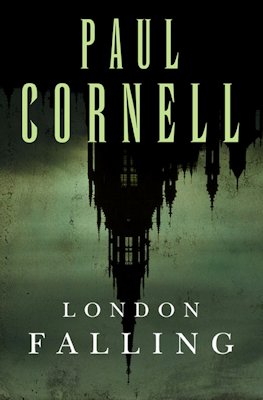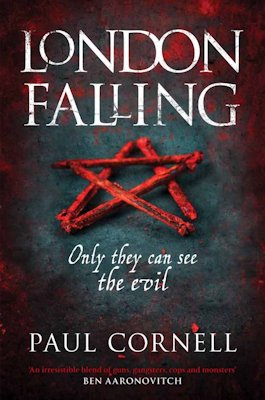Time is running out for undercover coppers Tony Costain and Kevin Sefton in Paul Cornell’s new novel London Falling. For years they’ve been working on exposing Rob Toshack for the kingpin of crime he undoubtedly is, but now that they’ve infiltrated the upper echelons of his organisation, the powers that be declare an imminent deadline: come hell or high water, they’re to take him at midnight tonight. But to date, their target’s been smart. The Met, for all their efforts, still don’t have anything solid to hold him on.
What a stroke of luck, then, that Toshack appears to be as desperate as our listless lot. As the witching hour approaches, he goes from door to door, robbing and ransacking with nary a care; searching, seemingly, for some way out of a situation that he shouldn’t know word one about. When he comes up with nothing, he’s nicked—alongside most of his enforcers.
Detective Inspector James Quill knows that the charges probably won’t stick, but he has at Toshack in the interview room in any event, giving it his exhausted all. Shortly, to the shock and horror of all involved, their prime suspect is in the middle of confessing to everything… when he goes and explodes!
[Quill] fell with the force of it, hit the desk and then fell. Great gouts of blood, far too much, flew around him, covering the furniture, the tape recorder, the room, as if a bucket of it had been thrown over him. Quill managed to heave himself upright, and found blood still showering like rain. He was covered in it. So was the brief, who was yelling hysterically. Toshack […] was just a mass of blood which had come from that mouth, that had burst from him, from his lolling dead head.
In the aftermath of this horrific incident, a small but perfectly formed unit of coppers is formed from the embers of Operation Longfellow. Quill, Costain and Sefton are all enlisted, whatever their differences, as is Lisa Ross, an outside intelligence analyst with inside ties to the Toshack family. With the clock ticking, their continuing mission: to investigate the impossible, explain the inexplicable—beginning with the spontaneous combustion of public enemy number one—and arrest the offending entities, be they beholden to Her Majesty’s laws of conduct or not.
Given that this is an urban fantasy novel, albeit in crime fiction’s clothing, I warrant they won’t be.
Having worked steadily in a spread of literary industries since winning a young writer’s competition in 1990, Paul Cornell is the sort of author whose name you don’t know that you know. If that’s the case, be warned you will after this. Currently, he scripts Demon Knights for DC’s New 52, Saucer Country for Vertigo, and his new Wolverine series is forthcoming from Marvel as part of the NOW! initiative. In the intervening years, Cornell has had a baker’s dozen of Doctor Who novels published, two non tie-ins entitled British Summertime and Something More, meanwhile he’s composed countless teleplays for UK mainstays such as Casualty, Coronation Street, and of course the Time Lord’s own show.
For all that, though, London Falling—and the sequels sure to succeed it in time—may be where Cornell makes his most lasting mark. He’s described it himself as “The Bill do Buffy,” and this is a remarkably apt reference point, though it may take a little explaining. Gone but not forgotten, The Bill was a British soap-opera-come-police-procedural, as interested in the highs and lows of the lives of its characters as the crimes they quashed each episode; not dissimilar to Cornell’s new novel. Buffy the Vampire Slayer, meanwhile, was all charm and banter, by way of weekly monsters and overarching big bads. Excepting the inimitable Whedonesque wit, London Falling can count all of the above amongst its eventual strengths.
Pity, then, that it begins so nondescriptly, with the lastmost morsels of another novel’s plot—or so it seems—and a cast of coppers so caught up in the crush to catch Toshack that they come across as caricatures: there’s the possibly corrupt undercover, the know-it-all new blood, and the no-nonsense boss who’s lost faith in the former. Only Lisa Ross, the obsessive analyst with a tragic past, reads as real from the first. The others take too long to develop beyond simple sketches, and though in the fullness of time their credibility increases, London Falling is something of a slog in the interim, particularly considering the author’s jocular verbosity.
A couple of hours into the novel, however, in the home of the wickedest witch there ever was in West Ham, everything changes. Our foursome become cursed with a sort of second sight which allows them to glimpse stark darkness gathering in a world under even London’s underworld. As Ross reports:
She had felt joys among the fears, even, but it had been mostly fear. There had been motion between the trees of Hyde Park, and strange lights manifesting, in colours she wasn’t able to put a name to. Things moved between the trees faster than was possible. There had been unexpected structures in silhouette. Shadows lurking under shadows.
From here on out, London Falling is suddenly alive with excitement. Once our officers have come to terms with their hellish new perspectives, they see Mora Losley for what she is—as do we—and their pursuit of her, under the umbrella of Operation Toto, is singularly gripping. Hereafter the sense of tension that had previously peppered the procedure spreads like an infection. There are some truly gruesome moments in the offing, and when Cornell hits home with a harrowing twist involving Quill, the stakes finally feel meaningful.
To wit,this manic middle section gives way to such a darkly fantastic last act that giving London Falling’s over-burdened opening a free pass seems a small price to pay. I only wish I could talk more about it, but to do so would be to give the entire affair away. Rather rest assured that at the end of the day, it’s a beautiful game, as they say, and alongside the fans of crime and urban fantasy fiction London Falling stands to attract—for all the right reasons, for once—soccer supporters will also be in their element.
Especially for the latter lot, then: though Paul Cornell fumbles his first touch of the football in altogether too long, in a terrific turn of events, he finds his feet… he shoots… he scores!
And the crowd goes wild.
Niall Alexander is an erstwhile English teacher who reads and writes about all things weird and wonderful for The Speculative Scotsman, Strange Horizons and Tor.com. Sometimes he tweets about books, too.











